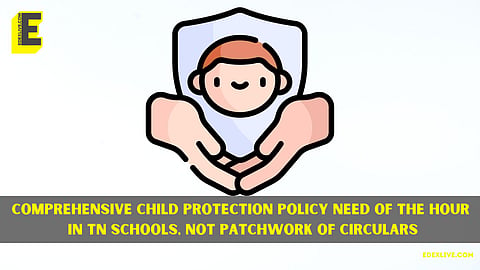

The School Education Department on Saturday, July 12, issued a circular directing schools to arrange student seating in semi-circles, a knee-jerk move made without assessing practicality or implications. The order received widespread criticism from several quarters, including the AIADMK. But this isn't an isolated incident.
The department has a pattern of issuing orders and circulars that often contradict, overlap or prove unworkable, especially on student safety.
Issued to prevent incidents from caste-based violence to sexual abuse, these orders have been largely reactive, fragmented and incident-driven, as the state still lacks a comprehensive child protection policy for schools. Without a unified framework, headmasters, teachers and officials remain unclear on existing policies and implementation, according to the report by The New Indian Express.
In the past three months alone, the department has issued several orders: one to take disciplinary action against Protection of Children from Sexual Offences (POCSO) offenders, another outlining guidelines to curb caste discrimination and a third introducing an SOP to protect girls participating in sports.
In December, a separate order mandated that external speakers undergo prior vetting due to backlash from a controversial speech given by a motivational speaker at a government school. The order also mandated the creation of a master list of approved speakers at the state and district levels, a task that seems to remain unfulfilled.
Consider the prevention of sexual harassment in schools and the protocols to follow when such incidents occur. The Student Safeguarding Advisory Committee (SSAC), formed through Government Order (GO) 83 in June 2021 with principals and teachers as members, was meant to address student safety. However, its role remains inconsistent in two subsequent GOs.
GO 89, issued in April 2025 to guide disciplinary action under the Pocso Act, doesn't mention the SSAC and instead directs any teacher, staff, or student aware of a Pocso offence to report it directly to the police. In contrast, the recent SOP for protecting girls in sports designates the SSAC as the first contact, tasked with escalating complaints to the DCPO.
It also mandates schools to maintain updated physiological, psychosocial, and family profiles of each participant and conduct annual background checks and psychological screenings of all teachers and coaches — an impractical request for most schools that lack the infrastructure or personnel.
Taking a subtle dig at the department's reactive approach, Tamil Nadu Child Rights Watch (TNCRW), in a recent letter to the School Education Director, remarked, "This guideline, which appears to be the 101st in a series of instructions and circulars related to children, reflects the department's concern for child well-being." They also noted the absence of a centralised repository where schools or officials can access these documents.
At least 10 headmasters The New Indian Express spoke to said they've lost track of directives and are unsure how to respond when issues arise. "Government schools have numerous committees, most of which don't function. Even during morning assemblies, we're expected to raise awareness on everything from road safety to drinking water to sexual abuse. There are no clear instructions, nor any coordination meetings with officials from other departments we must work with," said a headmaster from Sivaganga. Thenkanal Isaimozhi of Palli Kalvi Pathukappu Iyakkam said the department stops at issuing guidelines. He added that as days pass, these documents are often forgotten.
Activists pointed out that the issuance of many such documents often occurs without consulting other departments responsible for their implementation. Several guidelines even misidentify the role of District Child Protection Officers (DCPO), who function under the Social Welfare Department. For example, GO 89 refers to a 'Child Welfare Protection Officer', a role that doesn't exist. Social Welfare officials said they were unaware of the order, even though it tasks their DCPOs with investigating and submitting a report on POCSO cases.
"We are calling for a child protection policy in schools that addresses all aspects of children's safety and could include a model code of conduct for students after consultations with all stakeholders. Neighbouring states, like Karnataka, already have such a policy. With so many circulars being issued, teachers struggle to keep track. A unified, accessible policy for all schools would make implementation more effective," the letter said.
A senior school education department official that The New Indian Express contacted declined to comment.
Government Orders on student safety & teacher misconduct:
GO 121 - May 17, 2012
Issued by: School Education Department
States cancellation of all educational certificates of teachers involved in child sexual abuse
Implementation challenges:
Degree certificates issued by universities
Difficult to cancel across departments
No data on cancellations over 13 years
Employers struggle to verify certificate status
Other Key Government Orders & Guidelines
GO 83 - June 17, 2021
Formation of Student Safeguarding Advisory Committees (SSAC) in schools
Establishment of Central Complaint Centre (CCC) at state level
GO & Guidelines - November 2024
Framework for conducting extra and co-curricular activities in schools
GO 89 - April 3, 2025
Procedures for disciplinary action in POCSO-related cases
SOP - July 2, 2025
Standard Operating Procedure for protecting girls during sports events
Anti-Discrimination Guidelines - June 25, 2025
Prevents caste-based discrimination and violence in educational institutions
